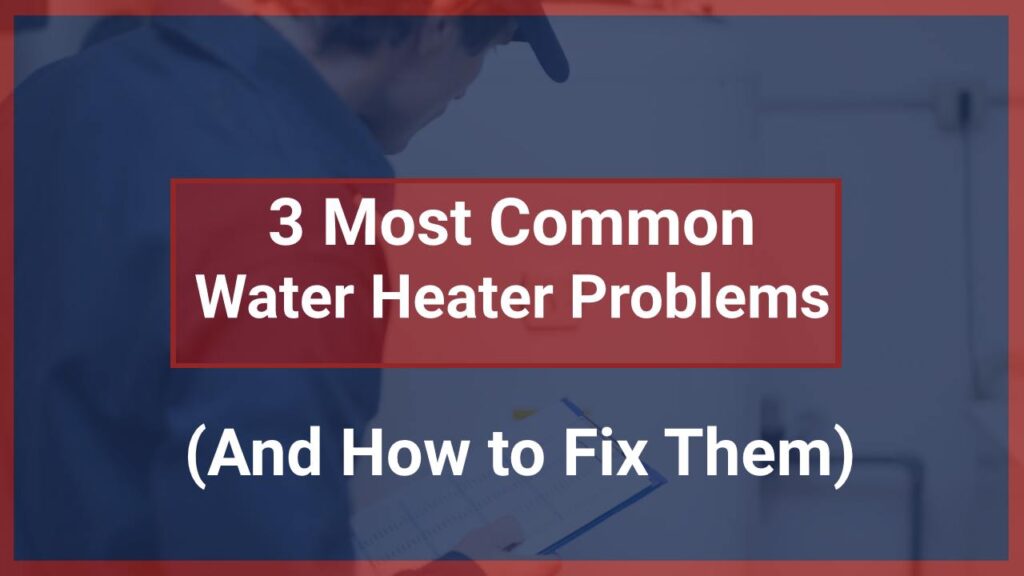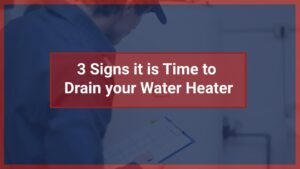Water Heater Problems Most Common
Sep 02, 20233 Most Common Water Heater Problems (And How to Fix Them)
It can be frustrating to face water heater issues, especially when relying on it for hot showers and clean dishes. Unfortunately, many homeowners in Phoenix, AZ, encounter similar problems with their water heaters. In this article, we’ll discuss the three most common water heater problems (and how to fix them).
Problem #1: My Water Heater Is Making Popping Sounds
Popping or cracking sounds often stem from sediment buildup at the bottom of the tank. Over time, minerals and debris can accumulate, creating a layer that interferes with the heating process. The popping sounds occur when the water trapped in the sediment overheats, creating steam bubbles.
Here are a couple of measures you can take to solve or prevent sediment buildup:
- Flush the tank: You’ll want to start by turning off the water heater and allowing it to cool down. Attach a garden hose directly to the drain valve and aim the other end to a safe drainage area. Open the drain valve and let the water flow until it runs clear. This will help flush out the sediment buildup.
- Conduct regular maintenance: To prevent future sediment buildup, consider flushing your water heater at least once a year. This simple maintenance task can significantly extend the lifespan of your appliance and keep it operating efficiently.
Problem #2: My Water Heater Is Leaking
A leaking water heater is inconvenient and can lead to water damage and potential safety hazards. Moreover, almost 70% of water heater failures are typically caused by a slow leak or sudden burst. Leaks happen for many reasons, including a defective pressure relief valve, loose connections, or a corroded tank.
So, if you’ve noticed puddles around your water heater, it’s essential to address the issue promptly and carry out the following solutions:
- Inspect the pressure relief valve: The valve is designed to release excess pressure to prevent the tank from exploding. If it’s leaking, it may be due to a buildup of mineral deposits. Try opening and closing the valve a few times to see if it resolves the issue. If the valve is still leaking, it may need to be replaced.
- Inspect connections: Check all the connections and fittings for signs of leaks. Tighten any loose connections using a wrench, but be careful not to overtighten.
- Replace a corroded tank: If the tank itself is corroded, it may be time for a replacement. Corrosion weakens the tank’s integrity and can lead to more severe leaks.
Problem #3: The Circuit Breaker Keeps Tripping With My Electric Water Heater
If your electric water heater continues tripping the circuit breaker, it could be due to an electrical issue within the system. This problem can disrupt your hot water supply and pose a safety risk. In fact, heating equipment is a leading cause of residential fires in the United States, accounting for 13% of home structure fires and 18% of home fire deaths.
It is thus vital to immediately address the problem. Here are the basic steps you can take to resolve the issue.
- Identify the cause: Start by unplugging the water heater and resetting the circuit breaker. If the breaker trips again immediately, there may be a short circuit or ground fault. Contact a professional electrician to pinpoint and fix the electrical problem.
- Check for overheating: If the water heater’s thermostat is set too high, it can cause the unit to overheat and trip the circuit breaker. Lower the thermostat setting and observe if the issue persists.
- Inspect wiring: Inspect the water heater’s wiring for any signs of damage or wear. If you’re uncomfortable working with electrical components, leaving this task to a qualified electrician is best.

What Can You Do To Extend the Life of Your Water Heater?
Regularly scheduled maintenance is key to extending the lifespan of your water heater and preventing common problems. Here are a few tips to help you keep your water heater in optimal condition:
- Adjust the temperature: Water heating accounts for about 18% of a typical home’s energy use. Hence, set the thermostat to a reasonable temperature to not only overburden your system but also avoid excessive energy consumption.
- Check the anode rod: The anode rod helps prevent corrosion within the tank. Inspect it annually and replace it if it’s significantly corroded.
- Test the pressure relief valve: Lift the valve’s lever to ensure it’s functioning correctly. This helps prevent pressure buildup that can lead to leaks.
- Schedule professional inspections: A yearly inspection by a qualified technician can catch potential issues before they escalate and ensure your water heater operates safely and efficiently.
The Plumber Guy: Water Heating Solution Experts
If you’re facing water heater problems beyond your DIY abilities, feel free to seek professional help. The Plumber Guy, a trusted plumbing service in Phoenix, AZ, can provide you with expert solutions for your water heater issues. Whether you need a water heater repair, replacement, or maintenance service, our eager and experienced team is ready to assist you. Request a new water heater price quote or schedule a repair visit today.
Final Thoughts
Dealing with water heater problems can be stressful, but with the right knowledge and approach, you can tackle the most common issues and keep your water heater running smoothly. For professional services, visit The Plumber Guy website to find a local plumber near you today.



